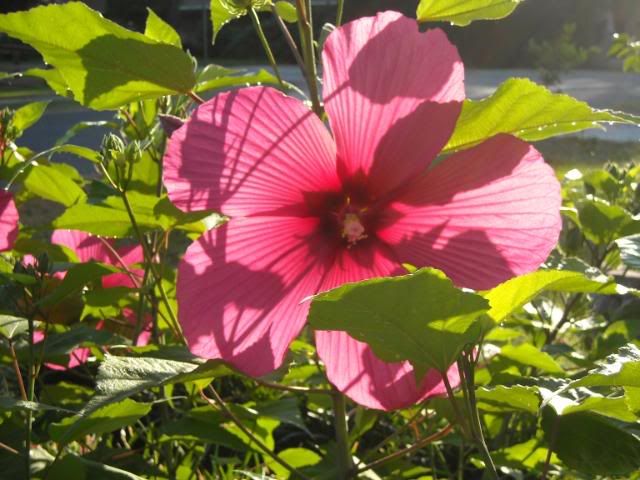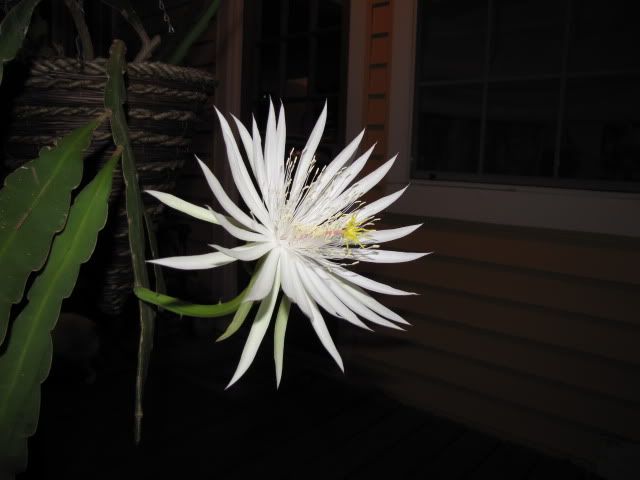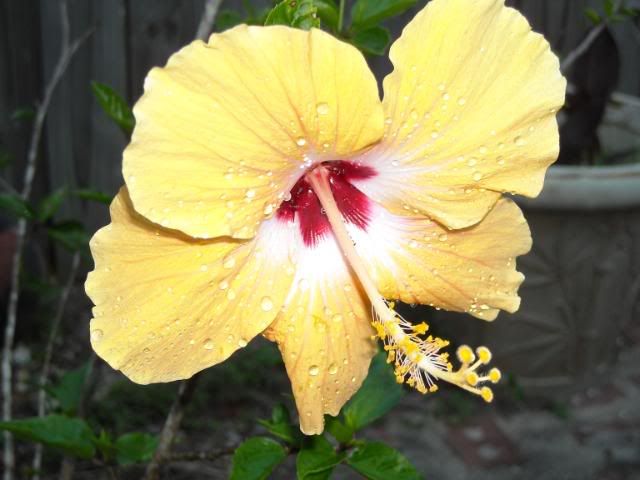
Randy in wheel chair joined by Karla to his right, among other Team HIKE members at the 2006 Walk to Defeat ALS.
One more time, here is my story. It's pretty mild as far as ALS goes, but fairly traumatic just the same. I don't share this so that you will feel sorry for me, or say touching things, but so that you will have some idea of what it means to have ALS or to care for somebody with ALS.
As the saying goes, God punishes us for what we cannot imagine ... and I could not have imagined this.
When Randy and I got married on January 2, 2004, we had known each other for years. Somewhere along the way, we had both gotten divorced, and somewhere else along the way, we agreed we were madly in love and meant to be together.
 Randy on the MegaWing at Lake St. John, 2004.
Randy on the MegaWing at Lake St. John, 2004.Since Randy was a bit older than me (22 years, 9 months, 7 days, for those who like to keep track of such things), he was worried what would happen if, as we grew old, he became sick. He was quite worried that since I was fairly young and pretty energetic, that as he got older and less able to do things, that I would leave him. He asked me to read "Tuesdays with Morrie", which I did, because he wanted me to see how sick someone could really be. He would say, you are so young. Are you sure you will want to be with me when I get old? What if I get sick?
And I asked him the same: what if I get sick? Anybody can get sick & die at any age. Of course, he said.
So after much debate, and a few years of great fun and happiness, we decided to get married. We didn't tell anybody. We called friends the night before to see who wanted to go hiking or paddling with us, and the first couple that were free? Well, we asked them to be the witnesses at our wedding.
And when my mom called to invite us over for a traditional New Year's Day dinner, we invited her along, too.
Randy called one of his kids to let her know, but she was unable to attend on such short notice, and the witnesses brought their son, who memorialized the event in pixels, and Drew was there, eating the rice he was supposed to be throwing, but that was it. For our reception, we had champagne and desserts at a nearby restaurant.
Shortly thereafter, we bought a house, built a fence, and then built a shed. We vacationed in Florida and then again in Toronto. We hiked and kayaked and rode our bikes and in-line skated.
Migraines, one doctor said. Carpal tunnel, said another. A pinched nerve, said the next, after learning that he'd been backpacking; you must have pinched a nerve while carrying your pack. It's all in your head; it's stress; you are psychosomatic.
And then, one February 2005 afternoon, the speech therapist at school said, have you considered ALS? I did the research and realized that with the progression, there were really only two choices: ALS or inclusion body myocitis. Since it ended up being the former, I'll describe that and let you research IBM on your own.
ALS, or amyotrophic lateral sclerosis, is better known as Lou Gehrig disease. That means some famous baseball player is believed to have had the disease, but nobody really knows what it means.
ALS does this:
- it takes away all voluntary muscle function. This includes, of course, the large muscles that control the arms and legs, and it also includes (among others) facial muscles that let a person smile and lungs that let a person breathe. My husband lost the ability to use his hands long before he was properly diagnosed; he developed "drop foot" and began tripping and falling.
(On a hike in Big Bend National Park, he fell from one rocky switchback to the next, a fall of about 7' or 8' ... "I tripped over my shoelaces," he said. I said, "You have ALS." Our friends who were with us said I was over-reacting: "people trip and fall sometimes; don't worry about it." This, as my sweet then-seven-year-old son pulled out his personal first aid kit to help stop the bleeding wound; this, as I had to drive more than an hour to the nearest pharmacy to restock my previously well-stocked first aid kit with even more gauze, antibiotic ointment, and tape.)
- in the rarest cases (i.e. there are no case studies on this, according to our doctors), ALS affects a person's brain. Most people with ALS know what is going on and just can't do anything about it; they eventually lose the ability to speak, to smile, to eat, to walk, to bathe, to use the bathroom, to do basically everything, but they generally do not the ability to reason.
My husband was the rarest of the rare. Oh yes, the doctors recognized that he had to be unique, and they told him so. But only 2 days before he died, and only after numerous brain scans and hospitalizations. I had been saying for a year that I thought the ALS was affecting his brain, but nobody was worried about that (except me, and again I was "over-reacting") because it was so rare. In the last three weeks of his life, Randy fought off a(n imaginary) cavalry with our orange towels; he reported me to the police because I wouldn't let him off his (imaginary) island; he reported me to the doctors because I left two (imaginary) little girls freezing to death in our laundry basket without a blanket; he wanted the (imaginary) shrimp out of his hands, but he didn't want it given to that (imaginary) damn alligator on the floor of our bedroom. He suffered auditory, visual, and tactile hallucinations.
Sounds simple, right? Getting Randy ready for work meant lifting him (175 pounds) into his wheel chair, bringing him to the bathroom, helping him on the toilet, putting him back in his wheel chair, washing his hands and face, brushing his teeth and hair, shaving his whiskers, bringing him back to the bed and lifting him onto the bed from the chair, rolling him from side to side so I could get his shirt and pants on, getting him back into the wheel chair, putting his socks and shoes on, packing his bag for work, preparing and feeding him breakfast, and then getting myself and my young son ready (and fed) before getting into the van.
Simple enough, right? Well, getting into the van meant lowering the wheel chair lift onto a landing - oh yeah, we couldn't get concrete because of Hurricane Katrina, and so a group of retired guys came over and dug out the needed area, filled it in with rocks and sand, and then laid 100 pavers with a lovely brick border - then I would have to drive the power chair onto the lift, raise the lift (which scarily shifted the entire van), then climb into the van and drive the wheel chair to the location where it could then be locked in place for travel. Randy had to be strapped into his chair because he had little torso strength and control, and then he and his chair were strapped into the van.
After dropping my son off at school and walking him in, I would bring Randy to work. At first, this meant a reverse of the above procedure, and then monitoring while he drove himself into the building, where someone else would help him get to his desk. Then, his office moved into one of the fancy new state buildings with handicapped accessible features that, well, weren't. The big "push me" button for the automatic doors didn't work; there was insufficient time to swipe the security card for entrance to the building and to drive the wheel chair through before the alarm sounded; the elevators did not have any accessible features; and once off the elevators, there were doors that didn't even have non-working "push me" buttons. So every day, I would call as I was getting close, and one of three friends would meet me in the front of the building - where I parked in a fire zone for months until a policeman one day wanted to give me a ticket and I noted that there were zero handicapped spots available and there was no loading zone; he called on the spot and within a week, the problem was remedied. (This policeman still works downtown, and I still think he is the greatest thing since sliced bread.) Once Randy and his wheelchair were unloaded, the friends took over and brought him through the obstacles into the building so he could continue working.
After work, we did the reverse.
Every day, during my lunch break, I would go to his building to feed him lunch, prepare his drink, and help him use the bathroom, which could only happen once per day while I was there. On nice days, I would walk over. In inclement weather, I drove. After he couldn't stay in the office for a full day any longer, I would pick him up from work, bring him home, feed him, help him with any personal hygiene needs, sometimes change his clothes, and always get him set up at the computer so he could do his afternoon work hours from home.
(Thank heavens for voice technology! It allowed Randy to work and keep his identity and dignity.)
At night, of course, there was more of the same, and on weekends. Holidays were a challenge. But we continued to travel! After diagnosis, we went to Orange Beach, Alabama; tent camping in Georgia and northern Alabama; and on a road trip up the western side of the Rockies all the way to Yellowstone National Park and then back down the eastern side of the mountains. Each of those trips could be an essay on its own, and I won't bore you with the details here.
And please keep in mind that I had the easy part: I was just the care giver. I was not occupying a body that was failing me. I wasn't living under a death sentence.
We had scores of volunteers in our "circle of care." My mom and siblings were of innumerable and unmeasurable help. Friend Susan came over every other week to clean the house, and friend Stella came on the alternate weeks; they just did whatever needed to be done - laundry, dishes, sweeping, changing the sheets, whatever. Friends Gay & Debbie came on the first Thursday of every month, and I swear they were like magical beings who even cleaned the baseboards; if I ever had any doubt whether they loved me, knowing that they changed the cat's litter box was a pretty good indicator! Friend Lisa brought my son to tae kwon do, took out the trash, and had kind words and a friendly shoulder at all times. Friends Christie & Paul cooked, carted my son around, and continued to vacation with us, despite the challenges of tent-camping in a motorized wheel chair with a breathing machine. (Yes, that really happened!) The guys from the hiking club built the wheel chair landing by the carport, made one bathroom more accessible, painted after a contractor made the other bathroom accessible. Friend Eric built a fence for the dog; friend Joe helped with physical therapy every single week; friend Mack Randy-sat when I needed to be somewhere. My neighbors would help pick Randy up when he fell, or bring over goodies when needed, or take care of Drew when Randy was taken away by ambulance time and again. Friends Gale and Kelly prepared wheat-free, gluten-free meals on a very regular basis.
Principal Carla and the Country Day School teachers supported Drew in his fundraising efforts, and they and most of his class joined our team for many ALS walks.
Friends Stafford, Tim, and Bea enabled Randy to work, and Ray and Hugh allowed it to happen. Son Brian and son-in-law Brock built a ramp and installed remote-controlled ceiling fans; daughter Emily was a constant support and did anything & everything without being asked whenever she was in town; daughter Bonnie came every Saturday to visit, cut fingernails and toenails, and to give me time to grocery shop and bring Drew to tae kwon do. My sweet son helped all the time, with everything, and without ever uttering a single complaint.
They say it takes a village to raise a child. It took a loving community to provide for Randy, and for me. I am eternally indebted and will be replenishing my karma for many lifetimes.
So quickly, Randy's health declined, and 17 months after diagnosis, nearly 2-1/2 years after the onset of symptoms, Randy had no more fight. He died the Saturday before Thanksgiving in 2006. There was much sadness among all who loved him. On that day, I lost my soul mate, the love of my life, and my dearest and best friend. But he was ready, and it was time to go.
It has been nearly four years. Those who have known me long know that I have a happy-go-lucky side, which I have finally found again. I tried to find balance between working full-time, and being a mom, and caring for a dying man, and I think I had it; now I try to find balance between working full-time, being a mom, and caring for myself. My soul is still pretty fragile, as are most souls I guess, and I appreciate all the life lessons I learned along the way.
Would I go back & change it if I could? In a heartbeat. But if I had to have that life experience, I am so glad to have my crew along with me for the ride. If I haven't said it before, thank you. You know who you are.

.JPG)


